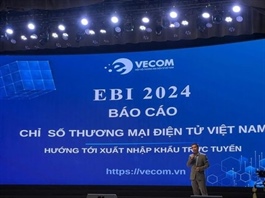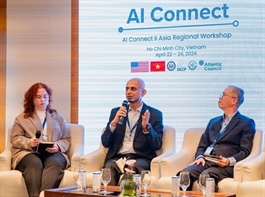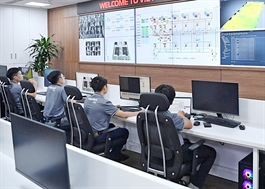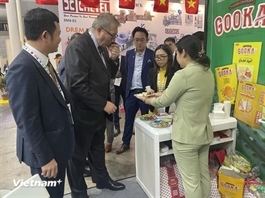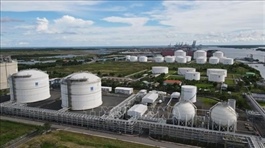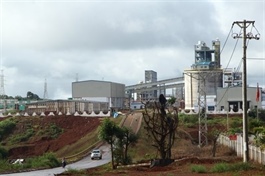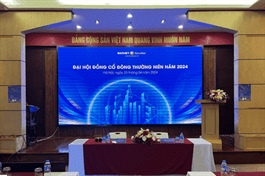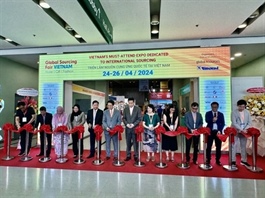Prime Minister urges IT training to focus on semiconductors
Prime Minister urges IT training to focus on semiconductors
With an abundant labor supply and a skilled workforce, human resources are Vietnam's greatest and most prominent advantage over other countries.
Vietnam could adapt its existing premises for the development of the electronics industry to train information technology manpower for the semiconductor field, Prime Minister Pham Minh Chinh hinted at the Conference on Human Resources Development for the Semiconductor Industry held on April 24.
|
An overview of the conference. Photos: VGP |
He added that human resources are one of the factors that make foreign partners want to invest in Vietnam. The country would gain partners' trust, promote investment attraction, and develop semiconductor production and supply chains if it prepared its workforce well, he said.
The Prime Minister also called on the participants to propose action plans for training institutions, research units, ministries, regulatory agencies, the government and local administrations "to launch a semiconductor industry personnel training movement based on existing infrastructure and resources, with some adjustments to achieve set goals without causing excessive impact.
Speaking at the conference, Minister of Planning and Investment Nguyen Chi Dung said that Vietnam has a once-in-a-thousand-year opportunity to participate in the value chain of the global semiconductor industry, as all stages of chip design, manufacturing, assembly, packaging, and testing will require an estimated one million additional workers worldwide by 2030.
He stressed that human resources are Vietnam's biggest and most prominent advantage over other countries, with an abundant supply of labor and skilled workers.
"Therefore, the focus on investment and training, the retraining of workers to enable them to enter the labor market as soon as possible, is a strategic direction," the minister emphasized.
The Ministry of Planning and Investment has closely coordinated with the ministries of Science and Technology, Information and Communication, Education and Training, Finance, and relevant agencies in the development process of the Project on Human Resource Development of the Semiconductor Industry to 2030, with a Vision to 2045, Dung said.
The Ministry of Planning and Investment has set up a drafting committee and an editorial team, conducted scientific and systematic research, compiled international experience and development trends, and the supply and demand of human resources for the global semiconductor industry.
"We have conducted surveys at over 100 domestic and international institutes, schools, and large enterprises, and gathered opinions from hundreds of experts, especially Vietnamese experts working in the semiconductor industry abroad, and relevant agencies through direct interviews and group discussions," Dung said.
|
Minister of Planning and Investment Nguyen Chi Dung |
"We believe that the sooner we put the project into practice, the greater the opportunity we have to take advantage of our human resources for development. Therefore, we should learn from experience and make modifications and additions according to the requirements of domestic and global realities," the minister noted.
The "Human Resource Development of the Semiconductor Industry to 2030, with a Vision to 2045" project aims to train 50,000 engineers for the semiconductor industry at all stages of the value chain. This includes 15,000 semiconductor circuit design engineers and 35,000 engineers in other areas of the semiconductor industry, including at least 5,000 with deep expertise in artificial intelligence. The project also targets the training of approximately 1,300 internationally qualified lecturers.
These targets have been identified by analyzing government and prime ministerial directives and practical market demands for the present and the next 5-20 years.
In addition, they based their decisions on the capacity assessments of leading universities involved in education in the fields and transition to the semiconductor industry. These leading universities include Vietnam National University - Hanoi and Ho Chi Minh City, Hanoi University of Science and Technology, and FPT University, each of which graduates approximately 3,000 to 6,000 students in relevant fields each year. Therefore, the target of 50,000 engineers by 2030 is feasible and may even be exceeded.
According to the minister, the main form of training will be short-term and advanced training and conversion of related training to the semiconductor industry. In addition, regular training programs will be implemented through close cooperation among three entities: the State, educational institutions, and enterprises, as well as international cooperation in curriculum development and attracting international experts to teach in Vietnam.
In the current context, in the initial stage, Vietnam should focus on training human resources to participate in stages such as design, packaging, testing and other production-related processes for equipment, materials and chemicals, the Minister said.
Dung suggested that Vietnam also needs at least four shared semiconductor centers at the national level, equipped with internationally standardized facilities, located at national universities and regional universities in the northern, central, and southern regions, as well as at the National Innovation Center. In addition, there should be about 18 basic-level semiconductor training centers in 18 technical universities to meet the requirements.



